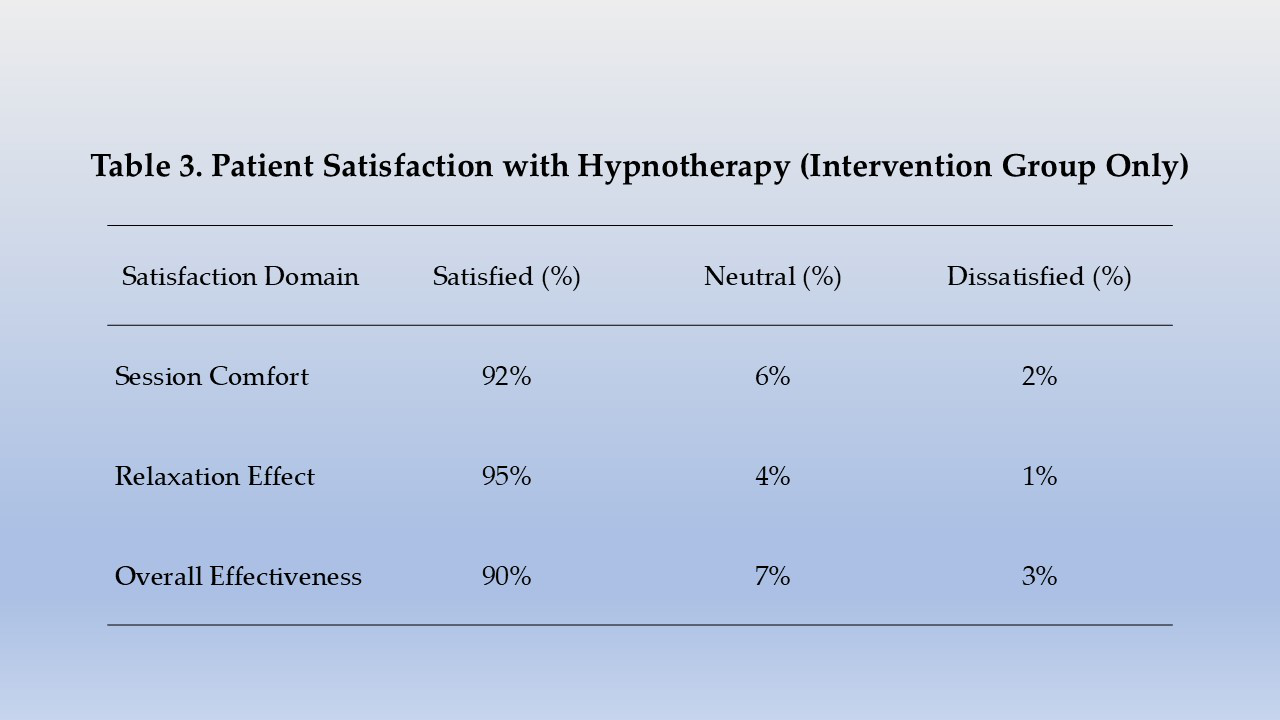The Effectiveness of Hypnotherapy in Reducing Stress among Individuals with Mental Health Disorders: A Quasi-Experimental Study with a Control Group
DOI:
https://doi.org/10.23917/bik.v18i2.9806Keywords:
anxiety, complementary therapy, hypnotherapy, mental health nursing, psychiatric disorder, stress reductionAbstract
Individuals with mental health disorders frequently experience elevated levels of stress and anxiety, which negatively impact their overall well-being. Hypnotherapy has been explored as a complementary nursing intervention to reduce psychological distress, yet its effectiveness in psychiatric settings remains under-researched. Objective: This study aimed to evaluate the effectiveness of hypnotherapy in reducing stress and anxiety levels among individuals with mental health disorders. Methods: A quasi-experimental pretest-posttest control group design was employed involving 80 participants diagnosed with psychiatric disorders, randomized into an intervention group (n = 40) and a control group (n = 40). The intervention group received six individual hypnotherapy sessions over four weeks, while the control group received standard psychiatric care. Stress and anxiety levels were measured using the Perceived Stress Scale (PSS-10) and the Beck Anxiety Inventory (BAI). Data were analyzed using paired t-tests and ANCOVA, with effect sizes and 95% confidence intervals calculated. Results: Participants in the hypnotherapy group showed a significant reduction in stress levels (mean difference = -8.4; 95% CI: -10.1 to -6.7; p < 0.001) and anxiety levels (mean difference = -7.4; 95% CI: -9.0 to -5.8; p < 0.001) compared to the control group. The effect sizes were large for both outcomes (Cohen’s d > 0.8). Additionally, 90% of participants in the intervention group reported high satisfaction with the treatment. Conclusions: Hypnotherapy appears to be an effective complementary intervention for reducing stress and anxiety in psychiatric patients. However, given the limited follow-up duration and sample size, future studies should investigate long-term effects, cultural factors, and integration into nursing practice.
Downloads
References
Browning, C.A.M. (2020) Application of the Roy Adaptation Theory to a care program for nurses, Applied Nursing Research, 56, p. 151340. https://doi.org/10.1016/J.APNR.2020.151340
Barbosa, F. C., Tadine, R. M., Rezende, J. D. P., Lopes, G. C. D., Attie, A., Machado, S., & Barbosa, E. S. (2024). Neuroscience Of Hypnosis: A Neurophysiological View Of Hypnotherapy’, Revista de Gestao Social e Ambiental, 18(4). https://doi.org/10.24857/RGSA.V18N4-077
Bekelepi, N. and Martin, P. (2022).Support interventions for nurses working in acute psychiatric units: A systematic review, Health SA Gesondheid, 27, p. 1811. https://doi.org/10.4102/HSAG.V27I0.1811
Berboth, S. and Morawetz, C. (2021) Amygdala-prefrontal connectivity during emotion regulation: A meta-analysis of psychophysiological interactions, Neuropsychologia, 153. https://doi.org/10.1016/j.neuropsychologia.2021.107767
Blessin, M., Lehmann, S., Kunzler, A. M., van Dick, R., & Lieb, K. (2022). Resilience Interventions Conducted in Western and Eastern Countries-A Systematic Review. International journal of environmental research and public health, 19(11) https://doi.org/10.3390/IJERPH19116913
Bloom, N. and Reenen, J. Van (2018). Roy Adaptation Model. NBER Working Papers, (January 2013), p. 89. http://www.nber.org/papers/w16019
Bryant, R.A. (2019). Post-traumatic stress disorder: a state-of-the-art review of evidence and challenges, World Psychiatry, 18(3), pp. 259–269. https://doi.org/10.1002/WPS.20656
Dineen-Griffin, S. et al. (2019) ‘Helping patients help themselves: A systematic review of self-management support strategies in primary health care practice’, PLoS ONE, 14(8), p. e0220116. https://doi.org/10.1371/JOURNAL.PONE.0220116
Herbert Benson’s Relaxation Response, Psychology Today. https://www.psychologytoday.com/us/blog/heart-and-soul-healing/201303/dr-herbert-benson-s-relaxation-response (Accessed: 15 June 2025).
Faerman, A. and Spiegel, D. (2021). Shared cognitive mechanisms of hypnotizability with executive functioning and information salience, Scientific Reports, 11(1), pp. 1–12. https://doi.org/10.1038/S41598-021-84954-8;SUBJMETA=2811,477,631;KWRD=HUMAN+BEHAVIOUR,PSYCHOLOGY.
Geagea, D., Ogez, D., Kimble, R., & Tyack, Z. (2024). Redefining hypnosis: a narrative review of theories to move towards an integrative model. Complementary therapies in clinical practice, 54, 101826.D. et al. (2024). https://doi.org/10.1016/J.CTCP.2023.101826
Gkintoni, E., Vassilopoulos, S.P. and Nikolaou, G. (2025) Mindfulness-Based Cognitive Therapy in Clinical Practice: A Systematic Review of Neurocognitive Outcomes and Applications for Mental Health and Well-Being’, Journal of Clinical Medicine, 14(5), p. 1703. https://doi.org/10.3390/JCM14051703
Guendelman, S., Medeiros, S. and Rampes, H. (2017) ‘Mindfulness and emotion regulation: Insights from neurobiological, psychological, and clinical studies’, Frontiers in Psychology, 8(MAR). https://doi.org/10.3389/FPSYG.2017.00220
Herman, J.P. et al. (2016) ‘Regulation of the hypothalamic-pituitary-adrenocortical stress response’, Comprehensive Physiology, 6(2), p. 603. https://doi.org/10.1002/CPHY.C150015
Johns, R.G. et al. (2019) A systematic review of therapist effects: A critical narrative update and refinement to review, Clinical Psychology Review, 67, pp. 78–93. https://doi.org/10.1016/J.CPR.2018.08.004
Kageyama, K., Iwasaki, Y. and Daimon, M. (2021) Hypothalamic Regulation of Corticotropin-Releasing Factor under Stress and Stress Resilience, International Journal of Molecular Sciences, 22(22), p. 12242. https://doi.org/10.3390/IJMS222212242
Khazraee, H. et al. (2023). The effectiveness of mindful hypnotherapy on difficulties in emotion regulation, mindfulness, and mental health in patients with major depressive disorder, Journal of Education and Health Promotion, 12(1), p. 365. https://doi.org/10.4103/JEHP.JEHP_1473_22
Kwame, A. and Petrucka, P.M. (2021) A literature-based study of patient-centered care and communication in nurse-patient interactions: barriers, facilitators, and the way forward, BMC Nursing, 20(1), pp. 1–10. https://doi.org/10.1186/S12912-021-00684-2/FIGURES/1
Leo, D.G., Keller, S.S. and Proietti, R. (2024). Close your eyes and relax”: the role of hypnosis in reducing anxiety, and its implications for the prevention of cardiovascular diseases, Frontiers in Psychology, 15, p. 1411835. https://doi.org/10.3389/FPSYG.2024.1411835
Lynn, Lynn, S. J., Green, J. P., Polizzi, C. P., Ellenberg, S., Gautam, A., & Aksen, D. (2019). Hypnosis, Hypnotic Phenomena, and Hypnotic Responsiveness: Clinical and Research Foundations—A 40-Year Perspective, International Journal of Clinical and Experimental Hypnosis, 67(4), pp. 475–511. https://doi.org/10.1080/00207144.2019.1649541
Moreau, D. and Wiebels, K. (2021) ‘Assessing Change in Intervention Research: The Benefits of Composite Outcomes’, Advances in Methods and Practices in Psychological Science, 4(1). https://doi.org/10.1177/2515245920931930/ASSET/ACC48167-2F8E-426B-80B2-D7644124793F/ASSETS/IMAGES/LARGE/10.1177_2515245920931930-FIG2.JPG
Mösler, T., Poppek, S., Leonhard, C., & Collet, W. (2023). Reflective Skills, Empathy, Wellbeing, and Resilience in Cognitive-Behavior Therapy Trainees Participating in Mindfulness-Based Self-Practice/Self-Reflection. Psychological reports, 126(6), 2648–2668. https://doi.org/10.1177/00332941221094482
Olendzki, N. et al. (2020) ‘Mindful Hypnotherapy to Reduce Stress and Increase Mindfulness: A Randomized Controlled Pilot Study’, International Journal of Clinical and Experimental Hypnosis, 68(2), pp. 151–166. https://doi.org/10.1080/00207144.2020.1722028;WGROUP:STRING:PUBLICATION
Östlund, U. et al. (2020) Combining qualitative and quantitative research within mixed method research designs: A methodological review, International Journal of Nursing Studies, 48(3), p. 369. https://doi.org/10.1016/J.IJNURSTU.2010.10.005
Patel, P.N., Horenstein, M.S., and Zwibel, H. (2024). Exercise Physiology, StatPearls [Preprint]. https://www.ncbi.nlm.nih.gov/sites/books/NBK482280/ (Accessed: 15 June 2025).
Rachul, C. and Varpio, L. (2020) ‘More than words: how multimodal analysis can inform health professions education’, Advances in Health Sciences Education, 25(5), pp. 1087–1097. https://doi.org/10.1007/S10459-020-10008-9
Rosendahl, J., Alldredge, C.T. and Haddenhorst, A. (2023) Meta-analytic evidence on the efficacy of hypnosis for mental and somatic health issues: a 20-year perspective, Frontiers in Psychology, 14, p. 1330238. https://doi.org/10.3389/FPSYG.2023.1330238/FULL
Shell, L. P., Newton, M., Soltis-Jarrett, V., Ragaisis, K. M., & Shea, J. M. (2019). Quality improvement and models of behavioral healthcare integration: Position paper# 2 from the International Society of Psychiatric-Mental Health Nurses. Archives of Psychiatric Nursing, 33(4), 414-420. https://doi.org/10.1016/J.APNU.2019.05.003
Singh, H. and Kumar, P. (2020). Efficacy of hypnotism in the management of psychiatric disorders. The International Journal of Indian Psychology, 8(3), pp. 341–350. https://doi.org/10.25215/0803.042
Stein, M. V, Lynn, S.J. and Summary, D.B.T. (2023). Reconciling myths and misconceptions about hypnosis with scientific evidence., BJPsych Advances, 29(6), pp. 391–392. https://doi.org/10.1192/BJA.2023.30
Stumpp, N.E. and Sauer-Zavala, S. (2022). Evidence-Based Strategies for Treatment Personalization: A Review, Cognitive and Behavioral Practice, 29(4), pp. 902–913. https://doi.org/10.1016/J.CBPRA.2021.10.004
Szmaglinska, M. et al. (2024). Exploring the Underutilized Potential of Clinical Hypnosis: A Scoping Review of Healthcare Professionals’ Perceptions, Knowledge, and Attitudes, International Journal of Clinical and Experimental Hypnosis, 72(2), pp. 109–138. https://doi.org/10.1080/00207144.2023.2276451
Trumm, A. (2018). Effectiveness of Hypnotherapy in Anxiety Disorders: A Systematic Review, Middlesex University [Preprint], (March). https://doi.org/10.13140/RG.2.2.33559.32169
Valentine, K. E., Milling, L. S., Clark, L. J., & Moriarty, C. L. (2019). The efficacy of hypnosis as a treatment for anxiety: a meta-analysis. International Journal of Clinical and Experimental Hypnosis, 67(3), 336-363. https://doi.org/10.1080/00207144.2019.1613863
Veldhuizen, S., Zawertailo, L. and Selby, P. (2021). Variability in outcomes and quality-of-care indicators across clinics participating in a large smoking-cessation program, Journal of Substance Abuse Treatment, 130, p. 108409. https://doi.org/10.1016/J.JSAT.2021.108409
Voss ME, Sandquist L, Otremba K, Kreitzer MJ. Integrative Nursing: A Framework for Whole-Person Mental Health Care. Creative Nursing. 2023;29(1):23-41. doi:10.1177/107845352202900112.
Weissman, D.G. and Mendes, W.B. (2021) ‘Correlation of sympathetic and parasympathetic nervous system activity during rest and acute stress tasks’, International journal of psychophysiology : official journal of the International Organization of Psychophysiology, 162, p. 60. https://doi.org/10.1016/J.IJPSYCHO.2021.01.015
Wolf, T. G., Faerber, K. A., Rummel, C., Halsband, U., & Campus, G. (2022). Functional changes in brain activity using hypnosis: a systematic review. Brain sciences, 12(1), 108. https://doi.org/10.3390/BRAINSCI12010108/S1
Ziegler, A., Peisl, T. and Ates, A. (2023). The Future of Agile Coaches: Do Large Companies Need a Standardized Agile Coach Certification and What Are the Alternatives?, Communications in Computer and Information Science, 1891 CCIS, pp. 3–15. https://doi.org/10.1007/978-3-031-42310-9_1

Submitted
Accepted
Published
How to Cite
Issue
Section
License
Copyright (c) 2025 Indra Ruswadi, Jummai Wennie, Ani Susiani, Masliha Masliha

This work is licensed under a Creative Commons Attribution 4.0 International License.


















